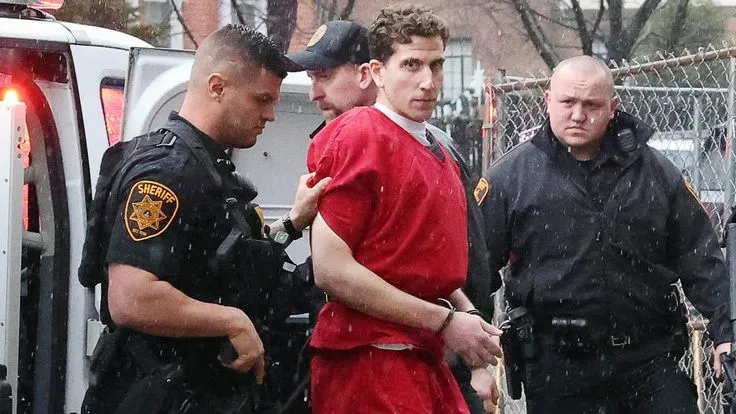The Bryan Kohberger case has shocked the nation. As the primary suspect in the horrific Idaho student murders, his name has become synonymous with one of the most disturbing criminal cases in recent American history. From his academic background in criminology to the chilling evidence connecting him to the crime scene, the case has captivated the public’s attention.
This article offers a comprehensive look at who Bryan Kohberger is, the details of the investigation, the trial proceedings, and how this case has left an indelible mark on society.
Who Is Bryan Kohberger?
Bryan Christopher Kohberger, a 28-year-old criminology PhD student, was relatively unknown before the tragic events of November 13, 2022. Studying at Washington State University in Pullman, Washington, Kohberger’s academic life was focused on understanding criminal behavior—a detail that has left many stunned given the allegations against him.
Born and raised in Pennsylvania, Kohberger was described by former classmates and professors as intelligent but socially awkward. His interest in psychology and criminology seemed to stem from a genuine curiosity about the minds of criminals. Ironically, this academic pursuit now serves as a grim twist in the narrative that surrounds him.
Beyond academics, he held a role as a teaching assistant and was reportedly critical and intense in his grading. Students noticed his demeanor changed near the time of the killings, with some describing him as more distracted and withdrawn.
The Idaho Murders: A Chilling Crime Scene
On the morning of November 13, 2022, the peaceful town of Moscow, Idaho, was shaken when four University of Idaho students were found brutally murdered in their off-campus home. The victims—Kaylee Goncalves, Madison Mogen, Xana Kernodle, and Ethan Chapin—were all college students with bright futures.
The scene was horrifying: a house full of blood, with signs of a violent struggle. The community, overwhelmed with grief and fear, demanded swift justice. Yet for weeks, there were no leads, no arrests, and no clear motive. This vacuum of information only intensified public speculation and media coverage.
The murders sent shockwaves through university campuses across the country, prompting heightened security, safety forums, and vigils. Parents and students were gripped with fear. The incident shattered the sense of security in small college towns.
How Bryan Kohberger Became a Suspect
The turning point came on December 30, 2022, when authorities arrested Bryan Kohberger in Albrightsville, Pennsylvania. The news was both shocking and confusing. How could a PhD student in criminology be linked to such a brutal crime?
Authorities pieced together an elaborate trail of digital and physical evidence. Among the most compelling were:
- DNA found on a knife sheath left at the crime scene
- Surveillance footage of a white Hyundai Elantra near the residence on the night of the murders
- Cell phone pings placing Kohberger in the area at suspicious times
Kohberger’s connection to the victims remains unclear, but investigators believe he may have stalked them in the weeks leading up to the crime.
In addition, Kohberger applied for an internship with the Pullman Police Department prior to the murders, citing a desire to assist law enforcement in better understanding how to collect and analyze data.
The Evidence Against Bryan Kohberger
DNA Evidence
One of the most damning pieces of evidence against Bryan Kohberger is the DNA found on a knife sheath recovered at the crime scene. According to forensic reports, the DNA was a match to Kohberger’s father, and through genealogical tracing, it was linked to Bryan himself.
Cell Phone Records
Investigators tracked Kohberger’s phone movements using cell tower data. The phone had been turned off during the estimated time of the murders—a suspicious move that authorities argue was intentional to avoid detection. However, data from before and after the murders showed Kohberger’s phone near the victims’ residence on multiple occasions.
Vehicle Footage
Surveillance videos from the night of the murders captured a white Hyundai Elantra—similar to the one Kohberger owned—cruising near the victims’ house. The timing and location of this vehicle strongly align with the events of the night.
Bryan Kohberger’s Background in Criminology
What makes this case even more eerie is Kohberger’s academic background. At the time of the murders, he was a PhD student in criminology at Washington State University. He had also completed a master’s degree in criminal justice from DeSales University in Pennsylvania.
Kohberger was reportedly conducting a research project on the psychological traits of criminals. Some of his past assignments and Reddit posts asked convicted criminals about how they planned their crimes and how they felt during and after committing them.
He was supervised by faculty who had expertise in forensic psychology, and his coursework included advanced profiling and statistical research. Yet despite this scholarly foundation, the real-world allegations against him have thrown his intentions and character into question.
Public and Media Reaction to Bryan Kohberger’s Arrest
The arrest of Bryan Kohberger sent shockwaves through the nation. The media coverage was relentless, and public opinion divided. Some saw the case as a sign of how advanced forensic science has become. Others saw it as a terrifying example of how someone so deeply immersed in criminal justice could become the very thing he studied.
Online communities exploded with theories, amateur sleuthing, and even sympathy for the suspect, reflecting society’s complex relationship with crime and justice. The families of the victims, meanwhile, expressed relief that someone had been arrested, but emphasized that their pain would never fully subside.
Television specials, documentaries, and podcasts soon followed, with experts dissecting every move Kohberger made. The attention raised ethical concerns about media sensationalism, especially regarding a case still awaiting trial.
The Legal Proceedings and Trial
Initial Court Appearances
Bryan Kohberger appeared in court in early January 2023. He waived extradition and was transported from Pennsylvania to Idaho. During his initial hearings, he appeared calm and emotionless, offering little insight into his mental state.
Charges Filed
Kohberger was charged with four counts of first-degree murder and one count of felony burglary. The prosecution has stated that they will seek the death penalty.
Pre-Trial Developments
Since the arrest, Kohberger’s defense has pushed back against the evidence, calling for certain items to be excluded from trial and arguing for a change of venue due to media bias.
The defense has also suggested that the DNA evidence might have been contaminated, and that surveillance footage alone cannot conclusively place Kohberger at the crime scene.
Further complicating matters, leaked court documents and testimony have sparked debates over the integrity of the investigative process. The question of whether the trial can truly be fair under the intense media spotlight remains a central concern.
The Psychology of Bryan Kohberger
Psychologists and criminologists have weighed in heavily on this case. Many believe Kohberger exhibits traits of narcissism and psychopathy. His academic background, coupled with the alleged precision of the crime, suggests a highly methodical individual.
Some speculate that Kohberger may have viewed the murders as a twisted form of experimentation or a desire to experience the crimes he studied. This theory has not been proven, but it reflects the chilling nature of the allegations.
His interpersonal relationships were reportedly limited. Neighbors and classmates described him as aloof and intense. Some even claimed he exhibited controlling or arrogant behavior, traits that may indicate deeper psychological issues.
Impact on the Criminology Field
The Bryan Kohberger case has caused significant introspection in academic circles, particularly within criminology programs. Professors and students alike are re-evaluating how they approach the study of crime, particularly when it comes to boundaries between theory and practice.
Some institutions have initiated new policies for monitoring student research topics more closely, especially those involving direct interactions with criminals.
The ethical dilemma of whether academic curiosity can veer into obsession has come under serious scrutiny. Universities are now reassessing application processes and mental health support for students in sensitive fields.
The Victims: Remembering the Lives Lost
While much attention has been given to Bryan Kohberger, it’s important to remember the victims: Kaylee Goncalves, Madison Mogen, Xana Kernodle, and Ethan Chapin. These were young people full of life, love, and potential.
Each had dreams, families, and communities that will never be the same. Their memories have inspired scholarships, memorials, and public calls for justice reform.
Their legacy lives on in the form of safety campaigns and educational initiatives started in their names. The university and their families have made continued efforts to keep their stories alive—not just as victims, but as cherished individuals.
Online Communities and the Rise of True Crime Obsession
True crime communities on platforms like Reddit, TikTok, and YouTube played a significant role in public discourse about the Bryan Kohberger case. Amateur sleuths attempted to piece together timelines, speculate about motives, and analyze court documents.
While some efforts were helpful, others led to misinformation and harassment. The phenomenon raises questions about the ethics of crowd-sourced investigations and the boundaries of public involvement in ongoing criminal cases.
Moreover, the glamorization of real-life tragedies has prompted victims’ families to speak out. They call for more respectful media practices that prioritize empathy over clicks.
What’s Next for Bryan Kohberger?
As of mid-2025, Bryan Kohberger awaits trial. Legal experts believe the trial will begin later this year or early next, and it promises to be one of the most watched in recent memory.
If convicted, Kohberger faces the death penalty. His defense team is expected to argue mental illness, question forensic integrity, and challenge procedural issues.
The trial will likely include expert testimonies, emotional victim impact statements, and a deep dive into Kohberger’s digital and personal history.
Observers expect high-stakes arguments on forensic validity, psychological evaluations, and possible appeals, should a conviction occur. The court proceedings will likely set legal precedents for future high-profile criminal trials.
🎓 Criminologist Turned Criminal
At the time of the killings, Kohberger was a PhD student in criminology at Washington State University and even served as a teaching assistant—just eight miles from the crime scene. Before that, he earned a master’s in criminal justice and a bachelor’s in psychology from DeSales University in Pennsylvania
💻 Reddit “Criminal Minds” Project
Kohberger once conducted a Reddit survey inviting ex-convicts to detail their thoughts and feelings during crimes—particularly exploring decision-making and emotional states during offenses.
“Hello, my name is Bryan and I am inviting you to participate in a research project that seeks to understand… psychological traits influence decision-making when committing a crime.”
🕵️♂️ Obsession with Serial Killers
Media reports and documentaries suggest Kohberger may have identified strongly with incel-driven killers like Elliot Rodger. He reportedly operated an online handle “Pappa Rodger” and engaged in discussions about Rodger—stirring speculation that he was deeply influenced by extremist, misogynistic ideologies.
⚖️ The Perfect Crime?
Given his academic training, some experts noted he nearly executed a flawless crime. It wasn’t until he dropped the knife sheath with his DNA at the scene that investigators linked him to the murders.
🧠 Mental Health & Unusual Traits
Court records reveal Kohberger is diagnosed with autism spectrum disorder, OCD, visual snow syndrome, and tinnitus Idaho Statesman . He also experienced a dramatic high‑school weight loss—dropping roughly 100 lbs—and underwent behavior changes, including bullying others as he gained self-confidence.
🤼 From Bully to Academic Overachiever
High‑school friends remember him as an “overweight outcast” who became socially awkward and was bullied by girls. After losing weight, he became more aggressive and at times bullied peers—exhibiting notable shifts in his personality.
🎯 The Mystery of Motive
Despite the wealth of detail about his background, his motive remains unclear. His guilty plea in July 2025 prevents a trial, meaning many questions—especially about why he chose his victims—may never be officially answered.
Conclusion: A Case That Changed America
The Bryan Kohberger case is more than a tragic crime—it is a mirror reflecting the complexities of justice, psychology, and human behavior. It challenges us to look deeper into the systems we trust and the people we think we know.
As the case progresses, one thing remains clear: the need for truth, accountability, and compassion for the victims and their families. https://vm.tiktok.com/ZSS1Gbyaq/
Whether Bryan Kohberger is ultimately found guilty or not, the impact of this case will be felt for years to come. It stands as a sobering reminder that evil can hide behind intelligence, and that justice is both a system and a moral imperative.



